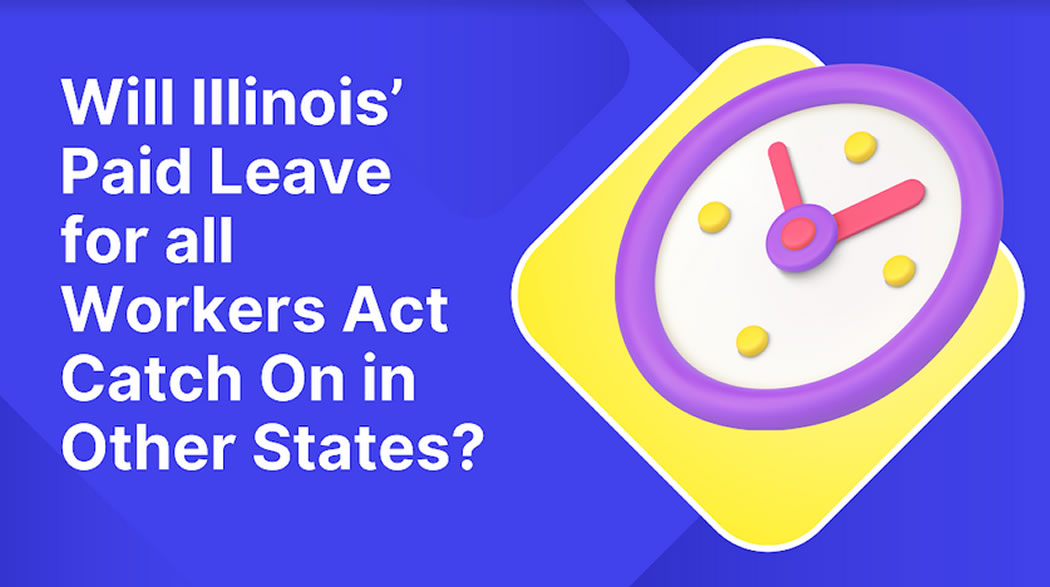
Maine, Nevada and Illinois are not necessarily the most obvious choices when it comes to predicting what states will come up with the most employee-friendly requirements. When it comes to PLFAW (an acronym we will all possibly have to get used to soon), the path has been cleared and we will soon see what other states and/or localities follow.
Paid Leave for All Workers will be required in the state of Illinois beginning January 1, 2024. Almost all workers will be provided 40 hours of paid time off per year for any reason at all, essentially mandating PTO. Employers currently subject to Chicago’s or Cook County’s paid sick leave ordinances, or any other county’s or municipality’s paid sick leave ordinance that goes into effect before January 1, 2024, will not be required to implement the state law and will only be required to provide paid sick leave to their employees under the terms of those ordinances.
It will be very interesting to track the impact of the Illinois law on other states. With the momentum well established moving toward increasingly generous paid time off requirements, can we expect other states to follow the lead?
For a detailed overview of the Illinois law, please continue to our blog…
New Illinois Law Mandates Paid Leave for Any Reason
The Illinois Paid Leave for All Workers (PLFAW) Act was passed by the Illinois legislature in January and was signed into law by Governor J.B. Pritzker on March 13, 2023. Effective January 1, 2024, it will require nearly all private sector employers in Illinois to provide employees a minimum of 40 hours of paid leave per year, which can be used for any reason. PLFAW makes Illinois the third state in the country to mandate paid time off for any reason.
And You Thought Tracking Time Off Was Already Difficult?
PLFAW will require virtually all employees to be provided paid leave at a rate of 40 hours per year. It’s important to note that unlike vacation or other PTO that must be paid out upon an employee’s separation from employment (according to the Illinois Wage Payment and Collection Act), paid leave under PLFAW that is accrued but unused doesn’t have be paid upon termination.
The main feature of PFLAW is that employees may use the paid leave for any reason, and employers can’t ask about the reasons for taking such leave. In addition, employers can’t retaliate because an employee uses PLFAW leave or otherwise exercises their rights under the Act. They also can’t consider an employee’s use of PLFAW leave as a negative factor in any employment action.
Employers may base the leave on an accrual method (one hour of leave for every 40 hours worked), or employers may “frontload” all 40 hours at the beginning of the leave year. The leave will carry over annually if the accrual method is used, but no carryover is required if employers frontload all 40 hours at the beginning of each year. If employers choose to use the accrual method (rather than frontloading the leave), then employees must begin to accrue at the start of employment or on the effective date of PLFAW, whichever is later. Additionally, exempt employees are deemed to work 40 hours per week for purposes of accruing PLFAW leave.
Employers can require reasonable notice for taking the leave (seven days for foreseeable leave), but it must have a written policy that contains procedures for any notice requirements. In addition, employers can require that employees use this leave in increments not greater than two hours. However, employers can’t require employees to find a replacement worker to cover the hours during which an employee takes PLFAW leave.
Everything Else You Need to Know
Employers already covered by the mandatory paid sick leave ordinances in Cook County or the City of Chicago won’t be covered by the new law. The State of Illinois and units of local government are covered by PLFAW, but school districts, park districts, certain transportation and construction employees, and short-term and student employees of institutions of higher education aren’t covered. The PLFAW requirements may be waived via a bona fide collective bargaining agreement that includes a clear and unambiguous waiver.
It’s also important to note that the time off must be paid at the employee’s regular hourly rate of pay. Special rules apply for employees who earn tips and/or commission, however.
PFLAW also requires employers to create and maintain records documenting hours worked, leave accrual (unless leave is frontloaded), and remaining PLFAW balances, and be prepared to confirm this information upon an employee’s request.
In order to make sure employees understand these new requirements, a notice of PFLAW rights must be posted.
Next Steps for Employers
Illinois employers should begin now to plan for this new law. Many employers already have paid leave policies that provide at least 40 hours of leave per year. However, even employers that already provide PTO will want to consider updating their leave policies in light of PLFAW’s provisions.
Article courtesy of content partner BLR. Author, Steven L. Brenneman is a capital partner and Chair of the Employment Law Group at Fox, Swibel, Levin & Carroll, LLP, in Chicago, Illinois.